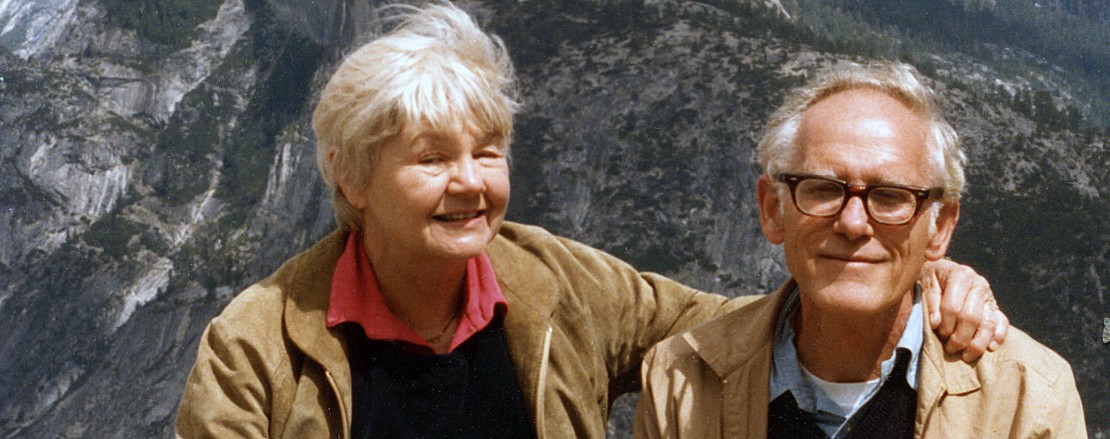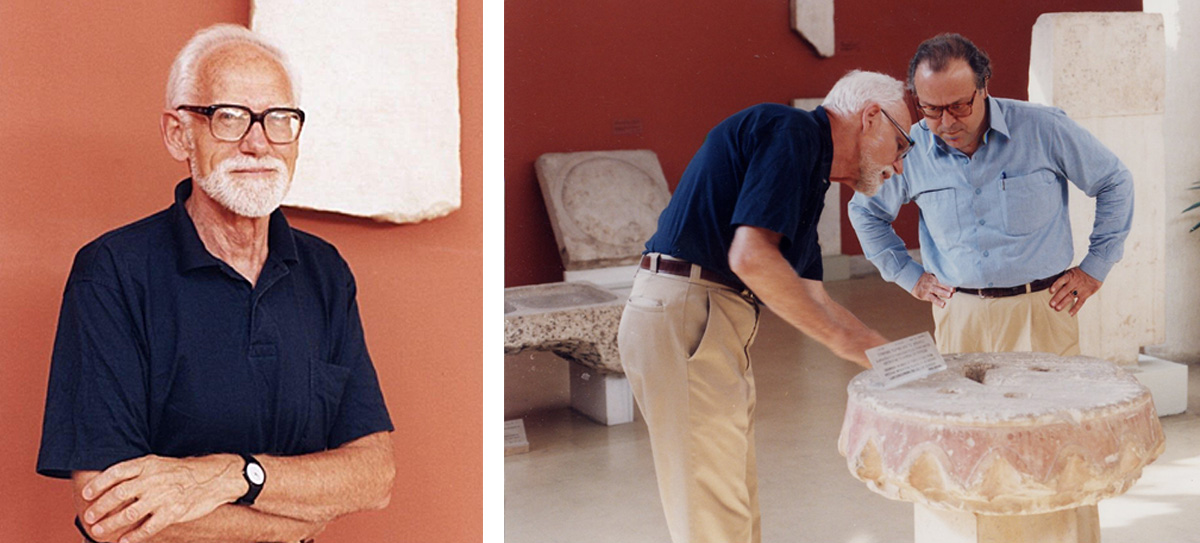Family and Friends of Michael H. and Virginia B. Jameson Name Colonnade in their Honor

The American School of Classical Studies at Athens is pleased to announce a gift from family and friends of Michael H. and Virginia B. Jameson to name the Colonnade in their honor and to celebrate their more than six decades of contributions to Classical Greek Studies. The Colonnade is located on the first floor of Loring Hall and connects the Eugene Vanderpool Dining Room with the Loring Hall Annex. Students and scholars come to this space to dine, learn, and socialize.
Michael H. Jameson, an archaeologist and historian, established an international reputation early in his career with his identification and publication of the Themistocles Decree in 1960. The inscription, which Jameson discovered in a coffee house in rural Greece, illuminated the history of the successful Athenian resistance to the Persians in 480 B.C. and has been called the most important document of the Persian Wars.
A specialist in ancient Greek religious, economic, and political history, Jameson was known for his holistic approach to the study of the past. He explored religion through its interrelationship with locality and natural environment; he analyzed political and social history through an expert epigrapher’s lens, and he had a thorough knowledge of classical literature; and in archaeological work, especially in the Argolid, he pioneered rural survey methods, balloon photography, and in the process redefined what it meant to study the ancient Greek countryside. His excavations in Halieis resurrected this ancient city in scholars’ consciousness. In all, Jameson wrote more than sixty articles and co-authored a seminal volume A Greek Countryside: The Southern Argolid From Prehistory to the Present Day. (Stanford, 1994).
“The genius of Mike Jameson was to combine work in three of the major classical sub-disciplines, ancient history, archaeology and epigraphy—and to be both a foremost international expert and a pioneer in all three,” said Paul Cartledge, a professor of classics at Cambridge University.
Martha C. Taylor, Professor and Chair of Classics, Loyola University Maryland, wrote, “Mike was a great scholar, but he was also a great teacher—two qualities that do not always go hand in hand. At Stanford he periodically taught a seminar on Greek sacrifice that everyone in residence knew to take. He taught the class collaboratively and somehow made all of us, from senior ABDs to quivering first-years, feel like we had something to contribute. …He was also the kindest and most generous of men.”
Jameson was “the opposite of the guy who shuts himself off in an ivory tower,” said his son Anthony. “He was constantly corresponding and visiting with colleagues from around the world, many of whom became close friends.”
Mark Munn, Professor of Greek History and Archaeology, Classics and Ancient Mediterranean Studies at Penn State University, recalled, “Dr. Jameson at first, but eventually just Mike!, was a wise advisor and steady guide from the beginning of my graduate career at Penn to the beginning of my professional career at Stanford. He directed my omni-versant enthusiasm into a practical course of study, and by his example he implanted in me a deep passion for learning about the Greeks... Mike and Virginia together were models of hospitality for students and colleagues alike, and with their home and family and friends who came to see them they were stellar examples of how satisfying a life of learning could be.”
“I thank my lucky stars that I landed at UPenn where Mike guided my education and both Mike and Virginia welcomed me into their extended family. I hope that this colonnade becomes a place where the distinctive Jameson combination of inquiry (from a broad range of disciplines), hospitality, friendship, and humor will be remembered and live on,” said Cynthia Patterson, Professor of History and Ancient Mediterranean Studies at Emory University.
Irene Polinskaya, Reader in Ancient History at King’s College London, shared: “Mike was my dissertation supervisor and the most important teacher and mentor I had at Stanford, even though I never took any classes with him as he was no longer teaching by then. Instead, in the shady garden of his Palo Alto home and in Virginia’s company, he taught by being an avid and enthusiastic listener of ideas, by encouraging direct engagement with modern Greece, and by giving brilliant advice. It is to Mike that I owe my own introduction to the American School, which turned out to be a pivotal moment in my life as a researcher, devotee of Greece, and fan of the Blegen Library.”

Left: Michael with the Themistocles Decree at the Epigraphical Museum in Athens, ca. 1980s. Right: Michael with Dr. Charalambos Kritzas at the Epigraphical Museum in Athens, ca. 1980s
About Michael H. Jameson
Michael Jameson was born in London on October 15, 1924. He spent several years as a boy in China (largely Beijing), where his father was working and where he had the opportunity to meet figures like I. A. Richards and Pierre Teilhard de Chardin. In 1935, he moved with his mother Rose Perel Jameson to England. He attended the City of London School, studying Greek and Latin during long rides to and from school on the Underground. During the war, he and his mother were evacuated to a school in the countryside.
Mike traveled to the U.S. at the age of 15 to attend the University of Chicago, receiving an A.B. in Greek (1942) at the prodigious age of 18. In that year, he met Virginia Broyles, fittingly, in a class on Thucydides. Michael then served in the U.S. Navy as a Japanese translator (1943–1946), and upon his return he and Virginia were married. During their happy, 58-year union, they raised four sons, Nick, Anthony, John, and David. Michael continued his studies in Chicago and received his Ph.D. (1949) with a dissertation on “The Offering at Meals: Its Place in Greek Sacrifice.”
Soon after completing his doctorate, Michael was awarded a Fulbright Fellowship for study at the American School of Classical Studies in Athens (1949–1950). He served briefly as Assistant Professor of Classical Languages and Archaeology at the University of Missouri, followed by a Ford Fellowship at the Institute for Social Anthropology at Oxford University (1953–1954). He then served as Professor of Classical Studies at the University of Pennsylvania (1954–1976), Chairman of the Graduate Groups in Classical Studies and Ancient History, and Dean of the Graduate School of Arts and Sciences. It was during that time that he directed excavations at Halieis. In 1976, he moved to Stanford University, where he became the Edward Clark Crossett Professor of Humanistic Studies. He died in 2004.
Michael was a member of the American Academy of Arts and Sciences, the American Philosophical Society, and the American Philological Association, of which he was president in 1981. He held visiting fellowships and professorships at the American School of Classical Studies, Athens; Christ Church, Oxford; the Institute for Advanced Study, Princeton; and the American Academy in Rome.
Mike and Virginia enjoyed opportunities to work at some of the world's most prestigious academic institutions: decades at the University of Pennsylvania and Stanford as well as stays in Oxford, Cambridge, Princeton, and many other places. But their most enduring devotion was to the American School of Classical Studies at Athens, to which they returned regularly over the course of more than half a century.
Their four sons did not gain much awareness of exactly what their parents were doing at the School, but they do have vivid memories of an exceptional year in their lives that was made possible by the School. In the academic year of 1965–1966, the whole Jameson family lived in one of the two houses adjoining the Gennadeion. Even as teenagers and pre-teens, they could appreciate what a privilege it was to live in this elegant building in a beautiful part of Athens with easy access to all of the major landmarks.
The sons are grateful for all that the American School did for their parents and for them, and they have been deeply moved by the support from so many of Mike’s and Virginia's friends and colleagues for the Jameson Colonnade.
About Virginia Jameson
Michael’s relationship with his wife of 58 years, Virginia (herself a teacher and scholar), remains equally charming. His first birthday present to her was a translation of the Bacchae of Euripides, which he had written for her "because I felt you needed a play dedicated to you." Together they traveled and worked in Mediterranean lands, and together they welcomed and sustained students and classicists at warm gatherings and individual evenings in their homes first in Pennsylvania and later in California.
Virginia’s life touched everyone, highlighting her generous spirit and lifeforce. The first page of her article Virtus Re-Formed ..., which she published at the age of 64, reflects several of Virginia’s tastes and talents: her love of literature and the Latin language; her subtle, creative mind and academic ability; and her skillful use of the English language.
About the Loring Hall Campaign
The Campaign was launched in October 2018 to raise funds for renovating and expanding the three aging buildings that have served as the intellectual and residential heart of the American School: Loring Hall, the Annex, and McCredie House. The Loring Hall buildings remain the place where members of the School community gather for meals, tea, ouzo hour, holiday celebrations, and lectures—a source of lifelong professional and personal relationships that characterize the collegial and intellectually vibrant atmosphere of the School. This modernized setting enhances that experience and will meet the needs of the School community well into the future.
Support the Loring Hall Campaign
The goal of the Loring Hall campaign is $10.2 million, inclusive of a maintenance endowment. Thanks to generous supporters of this historic initiative, more than $8.1 million has been raised to date. The newly renovated and expanded buildings were dedicated on Saturday, June 4, 2022, with a ribbon-cutting ceremony and reception for the School community.
To learn more about how you can support this historic initiative, please contact Nancy Savaides, Director of Stewardship and Engagement, at nsavaides@ascsa.org or 609-454-6810. Naming opportunities for a variety of spaces in the Loring Hall buildings are still available. Donors can choose from a wide range of gift levels to name a room or area in honor of themselves, an American School scholar, or a family member, friend, or group. Please click the links below to view the nameable spaces and options that remain: